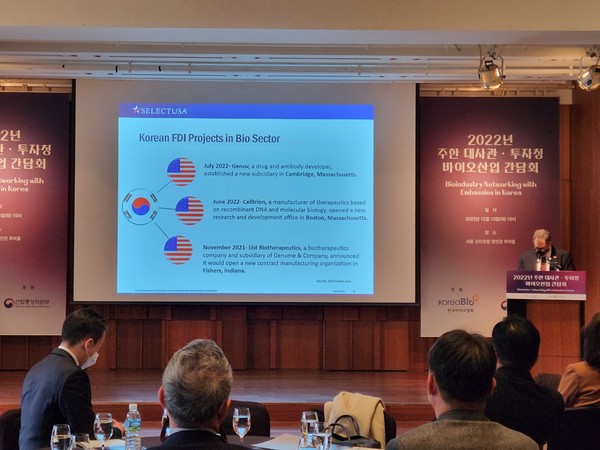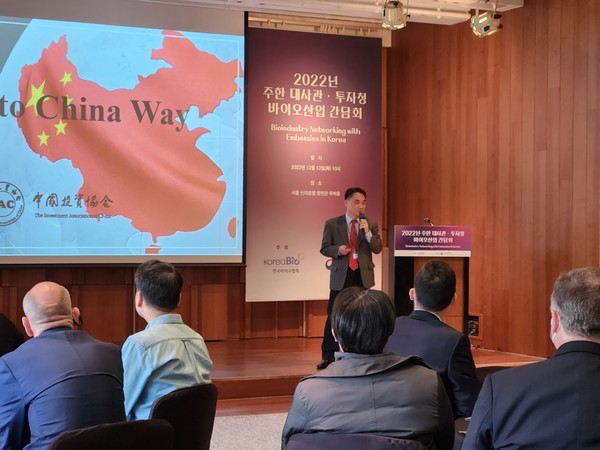Korea is home to a rapidly growing bioindustry; nothing showed this better than the Bioindustry Networking event hosted by KoreaBio Tuesday, which drew keen attention from the Swiss, U.S., U.K., Canadian, and Vietnamese embassies in Korea.

The who’s who of the local bio industry attended the event as speakers. Among them were Basel Area Business & Innovation Chief Representative Bon Oh, U.S. Embassy Counsellor for Commercial Affairs Jay Briggs, the Investment Association of China (IAC) Korean representative Kim Sung-jin, and IIDC Global CEO Noh Jae-hwan.
During the networking meeting, speakers shared trends of each country’s bio-industry and specific partnering strategies to strengthen ties with the Korean bio-industry.
Representing the U.S. bio market, Briggs spoke about the U.S. strength as the leader in the global bio industry. “Korea and the U.S. share $194 billion (253 trillion won) in bilateral trade, and Korea ranks as the 12th-largest source of foreign direct investment (FDI), and I hope this figure can keep growing in the coming years,” he said.
In this regard, he also noted President Joe Biden’s executive order to launch a National Biotechnology and Biomanufacturing Initiative, which could help provide tax incentives or other financial support to Korean companies with business in the U.S.
Briggs mentioned the Select USA program, encouraging small- and medium-sized biocompanies to consider the U.S. for business, which helps overseas biocompanies navigate the regulatory system and link with companies and resources. Additionally, he spoke about the Select USA Summit as a perfect venue for small and big pharma companies, as it attracts a wide international audience and will be held in February next year.

Kim offered some methods to enter the Chinese market. He admitted it is not easy to enter the Chinese market but emphasized that China is trying to revive the Silk Road to attract more global investments.
He explained that the best way for Korean biocompanies to enter China was through the IAC, saying, “As we have offices in different regions in China, we can provide specific help for each district in China.” He specifically highlighted Beijing and Shanghai as the easiest district for conducting business.
Bon said it is very easy to do business in Switzerland. However, he emphasized the Swiss advantage of providing access to other key European markets like France and Germany as they share a border. As a key partner in Europe, he also stressed that the Swiss tax rate of 14.9 percent is significantly lower than other European markets and Korea’s 25 percent.
In Basel, taxes are lower, with 13 percent, and can even be reduced to 11 percent if companies register their patent intellectual property (IPs) in Basel, Bon added. But, he said, “I am surprised we don’t have more Korean companies and hope these incentives can attract more Korean bio-companies in the future.”
Precision Biosensor’s Chief Commercial Officer Swan Sohn said, “I think these programs should be better advertised so more Korean start-ups and small- and medium-sized companies can take advantage of these opportunities. I hope we can participate in the Select USA Summit next year.”
Noh highlighted Korean companies' successful partnering and licensing strategies to enter the global market. He cited recent examples of mergers and acquisitions like Lotte Corp. buying out Bristol Myers Squibb’s (BMS) biologics plant in Syracuse and licensing deals like Celltrion Healthcare's partnership with Abpro to commercialize Abpro’s antibody therapy.

